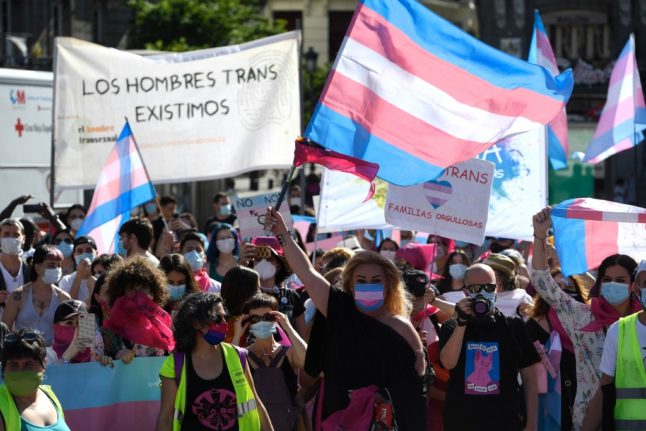Approved by 188 votes in favour to 150 against and seven abstentions, the bill now moves to the Senate where, if left unchanged as expected, it will become law within weeks.
The draft bill effectively simplifies the procedure for changing gender on a person’s national identity card, allowing them to request the change based on a simple statement.
But the text has sparked a bitter dispute among activists in Spain’s powerful feminist lobby and LGBTQ equality campaigners.
In Europe, Denmark was the first country to grant such a right in 2014.
The legislation is one of the flagship projects of the ministry, which is held by Podemos, the radical left-wing junior partner in Prime Minister Pedro Sánchez’s Socialist-led coalition.
“At last this law depathologises trans lives and guarantees trans people’s rights,” Equality Minister Irene Montero told parliament during Wednesday’s debate.
“Trans women are women,” said the minister, a strong advocate of gender self-identification who has denounced opposition to the law as “transphobia”.
Until now, adults have been allowed to request the change in Spain with a medical report attesting to gender dysphoria and proof of hormonal treatment for two years, while minors needed judicial authorisation.
But the bill drops that requirement and lets anyone from age 16 freely change their designated sex on their ID card. Even those as young as 12 can apply but only under certain conditions.
After submitting the request, the applicant must confirm the demand three months later, then it will become valid.
The legislation also bans conversion therapies, promotes non-discrimination against LGBTI people in the workplace and seeks “to advance the inclusion” of transgender women in particular who tend to be disproportionately affected.
Friction on the left
Adopted by the cabinet in June 2021, the bill has sparked tensions between Podemos, the driving force behind the legislation, and the Socialists who have tried in vain to modify it.
It has also divided the feminist movement between those supporting Montero and the powerful feminist lobby allied with the Socialists who are implacably opposed to the text.
“When gender is asserted over biological sex, it does not seem to me to be a step forward in a progressive direction; it seems to be a step backwards,” Sánchez’s former deputy Carmen Calvo told El Mundo daily in September.
“The state has to provide answers for transgender people, but gender is neither voluntary nor optional,” said Calvo, who headed the equality ministry when it was held by the Socialists and one of the bill’s most vocal opponents.
Activists fear the law will be open to abuse and erode women’s rights, allowing men who self-identify as women to compete in women’s sport or request a transfer to women’s prisons.
They have also raised the alarm about minors having the right to self-determine gender — with parental authorisation from the age of 14 and with both parental and judicial approval from 12.
Although the Socialists pushed for an amendment that would have extended judicial authorisation to include 14 to 15-year-olds, it was rejected in what was widely seen as a victory for Montero and Podemos.
“The transgender law which will be approved today in parliament symbolises the Socialist party’s biggest defeat by Podemos during this legislature,” the conservative El Mundo newspaper said Thursday, while the centre-left El País said it was “one of the laws that had most strained the coalition government”.
Tensions around the legislation prompted Socialist LGBTQ activist Carla Antonelli — the first and only trans woman to serve as a lawmaker — to resign from the party after decades of activism.
“We have seen part of the Socialist party and the feminist movement go from defending the rights of the trans minority to ruthlessly boycotting our very existence,” she wrote in an op-ed published by El País on Thursday.



 Please whitelist us to continue reading.
Please whitelist us to continue reading.
Member comments